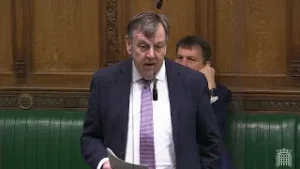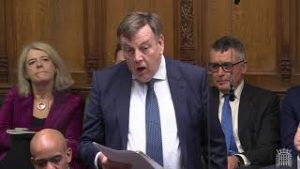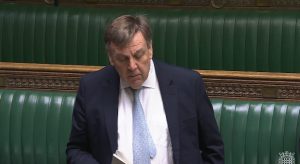Douglas Alexander Minister of State (Cabinet Office), Minister of State (Department for Business and Trade)
I wish to make a statement on the progress that this Government have made towards a UK-India trade deal. I am delighted to inform the House that we have now concluded negotiations on a comprehensive, modern agreement with the fastest-growing economy in the G20.
Hon. Members will no doubt be aware that India is expected to be the third-largest economy in the world by 2028. By the end of this decade, it will be home to an estimated 60 million middle-class consumers, and with trade between the United Kingdom and India already standing at north of £43 billion, we know that this powerhouse economy is and will remain a hugely important market for British businesses. While past Governments have failed to negotiate a deal with India, this Government have today succeeded. We have brokered the most generous trade deal ever agreed by India in its history.
From day one of this deal coming into force, it will make trade between our countries cheaper, easier and quicker. UK exporters will benefit from much lower tariffs across a whole host of sectors, including those that we are prioritising in our industrial strategy. It means simplified customs processes for businesses in advanced manufacturing and aerospace, in the food and beverage sector, and in the creative sector, which will benefit from improved copyright protection.
For our world-leading financial and professional services companies, this deal locks in access to India’s fast-growing market. It will ensure that UK banks and finance companies are placed on an equal footing with Indian suppliers, and it encourages the recognition of professional qualifications, so that UK and Indian firms can access the right talent at the right time, whether they are in Mumbai or Manchester. This deal will unlock new opportunities for businesses in every part of the United Kingdom, including our advanced manufacturing companies in the north-east, our iconic Scottish whisky brands and our car plants in the west midlands. In all, we will have secured over £400 million in tariff reductions in the first year alone, doubling to around £900 million after just 10 years.
Crucially, the deal we have negotiated will provide bespoke support for small and medium-sized enterprises to enter the Indian market, alongside a firm commitment from India to address the trade barriers that those businesses face. Since taking office, we have committed to hardwiring the views and interests of small businesses into everything we do, and the deal we have negotiated is evidence of that. For the very first time, British businesses will have guaranteed access to India’s vast procurement market, covering goods, services and construction. They will be able to bid for approximately 40,000 tenders worth at least £38 billion a year.
The deal that we have just got over the line is further proof that this Government are using the power of international trade and investment to raise living standards here at home. Indeed, experts predict that it will boost our bilateral trade by some £25.5 billion. It is also projected to increase UK wages by £2.2 billion each year, while adding nearly £5 billion to our GDP over the long run.
We have done all that while defending stoutly the UK’s national interest. We have brokered a deal that protects our NHS and upholds our high food standards. It ensures that our points-based immigration system remains unaffected. The deal demonstrates our commitment to both workers and businesses, staying true to our Labour values while contributing to our primary mission of economic growth.
I recognise that this House will need time to scrutinise the deal before the ratification process. My Department will follow the process set out in the Constitutional Reform and Governance Act 2010 in sharing the finalised treaty text with hon. Members. The House will, of course, have the opportunity to scrutinise any legislation associated with its implementation.
This deal sends a powerful message about the UK and India’s shared commitment to free, fair and open trade. The UK-India relationship has deep, enduring roots, exemplified by the living bridge of 1.9 million people of Indian heritage living in the United Kingdom. While I do not personally lament that Rishi Sunak is no longer the UK’s Prime Minister, it would be wholly wrong of me not to acknowledge his significant achievement as the first British-Indian Prime Minister, which is a testament not just to his own ability but to the close bonds that unite our two nations.
The Government are proud to back open markets and free trade. We recognise that Britain has always been an open, outward-looking trading nation, and we believe that open markets and free trade are fundamental building blocks with which the UK can secure its opportunities and prosperity at home and abroad. Through our upcoming trade strategy, we will set out our ambitions to engage with more industrial giants, like India, to ramp up trade and investment over the coming months and years.
Today, though, as close trading partners and as friends, I am proud that we have secured this deal with India. It is a deal that affords UK businesses certainty and stability during a time of global uncertainty and instability, and a deal that will give British businesses access to one of our biggest markets abroad, while raising wages and driving growth here at home. That is what this deal delivers, and I commend this statement to the House.
John Whittingdale Conservative, Maldon
I welcome the Indian trade deal, but will the Minister now switch his attention to the other side of the Atlantic, and ask Lord Mandelson to explain to the United States Administration that tariffs on films are unworkable and impossible to implement, and would do real damage to the film industry not just in the UK but in the United States?
Douglas Alexander Minister of State (Cabinet Office), Minister of State (Department for Business and Trade)
I pay tribute to the right hon. Gentleman’s long-standing interest in matters relating to culture, media and sport and to the creative industries more generally. We are grateful for the expertise and experience that he brings to the House on these issues.
It would be one of the first occasions on which I told Lord Mandelson to do anything in many decades of our working together, but I will ensure that that is duly registered, not only in the record of this House but directly to our distinguished ambassador in Washington. It should also be placed on record that the film sector is a key part of the UK’s world-class creative industries—and we are absolutely committed to ensuring that those sectors continue to thrive and create good jobs—and that the UK has a strong and balanced trading relationship with the United States, worth £315 billion.
I am grateful to the right hon. Gentleman for his challenge to me to reach out directly to Lord Mandelson in respect of what we have read in the newspapers in the last couple of days, and I give him my word that I will ensure that Lord Mandelson is fully aware of the issue.


